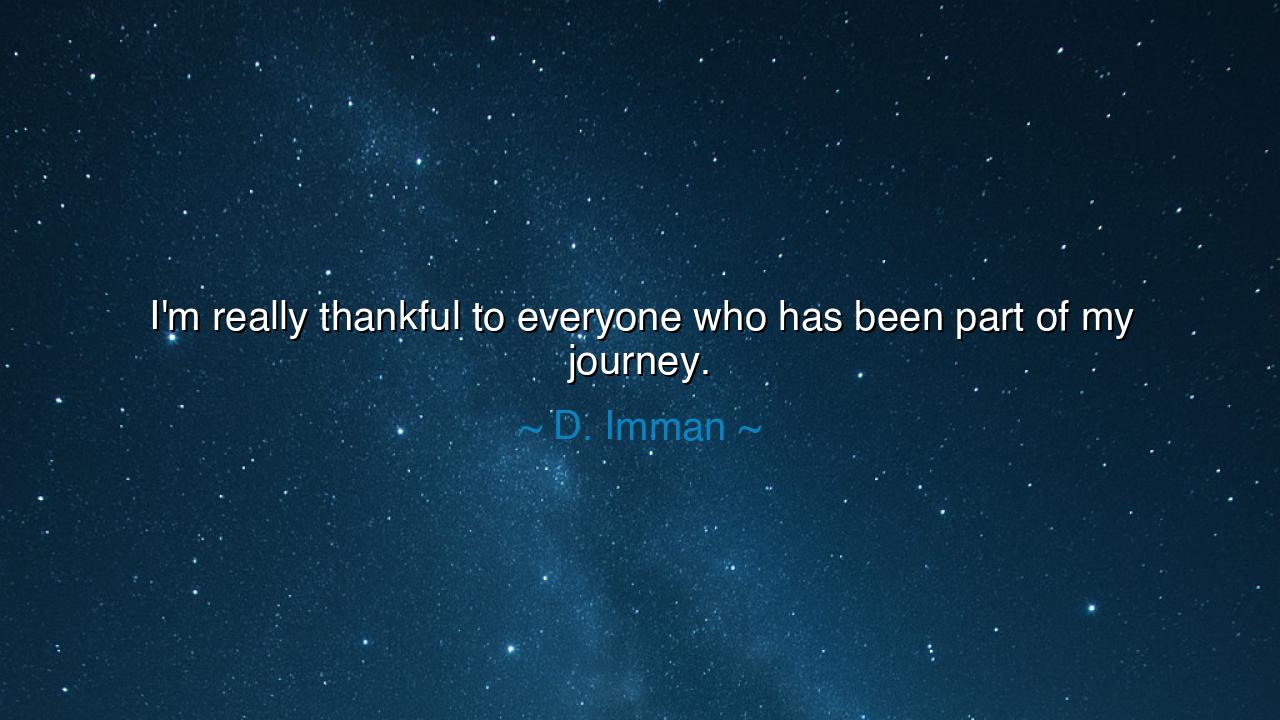
I'm really thankful to everyone who has been part of my journey.






The words of D. Imman, “I’m really thankful to everyone who has been part of my journey,” are not merely the quiet acknowledgment of a musician’s career, but the ancient voice of wisdom that recognizes the truth of human destiny: no one rises alone. His gratitude reveals a profound humility, for he sees that his path has been woven by many threads — family, mentors, companions, and even strangers who offered kindness at crucial moments. To speak such words is to honor the hidden architects of one’s life, those who made the road smoother, or at times carried the weary traveler upon their shoulders.
The ancients often taught that the hero may stand in glory, but the roots of his strength lie deep in the soil of community. Achilles had his Patroclus, Alexander had his generals, and every sage had a teacher before him. Gratitude, then, is the act of looking back with clear eyes and recognizing that behind every triumph there is a chorus of unseen helpers. D. Imman’s words echo this timeless recognition — that thankfulness is not weakness, but greatness, for it lifts up others rather than exalting self alone.
Consider the example of Abraham Lincoln, who, upon winning the presidency, never ceased to remember those who helped him rise from poverty to power. He often recalled the sacrifices of his mother, the encouragement of neighbors who lent him books, and the patience of those who bore with his failures. Lincoln’s greatness was not simply in his leadership, but in his willingness to confess: “All that I am, or ever hope to be, I owe to my angel mother.” Like Imman, Lincoln knew the journey was not his alone, but shared with countless others whose love and labor sustained him.
This kind of thankfulness does more than honor the past; it shapes the heart for the future. For the arrogant man who claims sole credit becomes isolated, and his triumphs turn hollow. But the grateful man is bound to others with cords of loyalty, kindness, and humility. He walks not as a solitary figure, but as one who carries his people with him. Gratitude thus becomes a source of strength, for it reminds us that we are never alone, and that our journey is a shared pilgrimage.
There is also in Imman’s words a quiet call to action. If we have been helped, then we are also called to help. If hands lifted us in times of weakness, then our hands must be ready to lift others. This is the ancient rhythm of life: the chain of giving and receiving, where no blessing is hoarded but passed onward. Gratitude is the seed, and service is its fruit.
The lesson is clear: each person who hears these words should pause and ask — who has been part of my journey? Who has lifted me, encouraged me, sacrificed for me, or guided me when I was lost? Speak their names with honor, and give thanks while there is yet time. And then, become that person for another. In this way, we create a cycle of gratitude and generosity that shapes not only our own destiny, but the destiny of all who come after us.
As practical action, let each day end with remembrance. Before sleep, recall one person who has contributed to your path, and give thanks — whether in prayer, in word, or in silent remembrance. Reach out when you can to those who live still, and let them know their impact upon your life. And in your daily walk, be mindful: you too may be a crucial part of someone else’s journey, though you may never know it.
Thus, D. Imman’s words carry the power of eternal truth: be thankful for those who walk with you, for your journey is never yours alone. Honor them, cherish them, and then take your place in the great chain of humanity — giving as you have received, and ensuring that no traveler walks without companions along the way.






AAdministratorAdministrator
Welcome, honored guests. Please leave a comment, we will respond soon